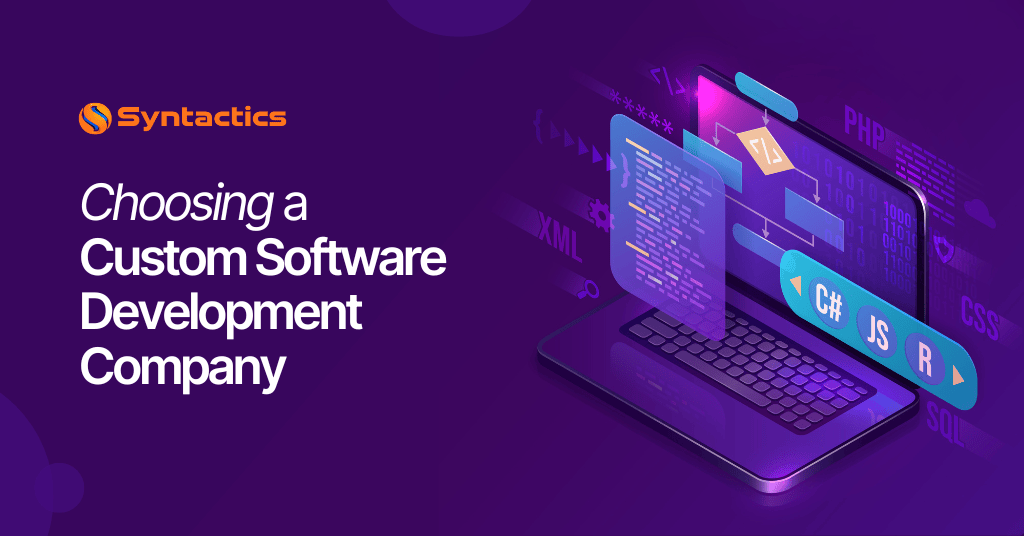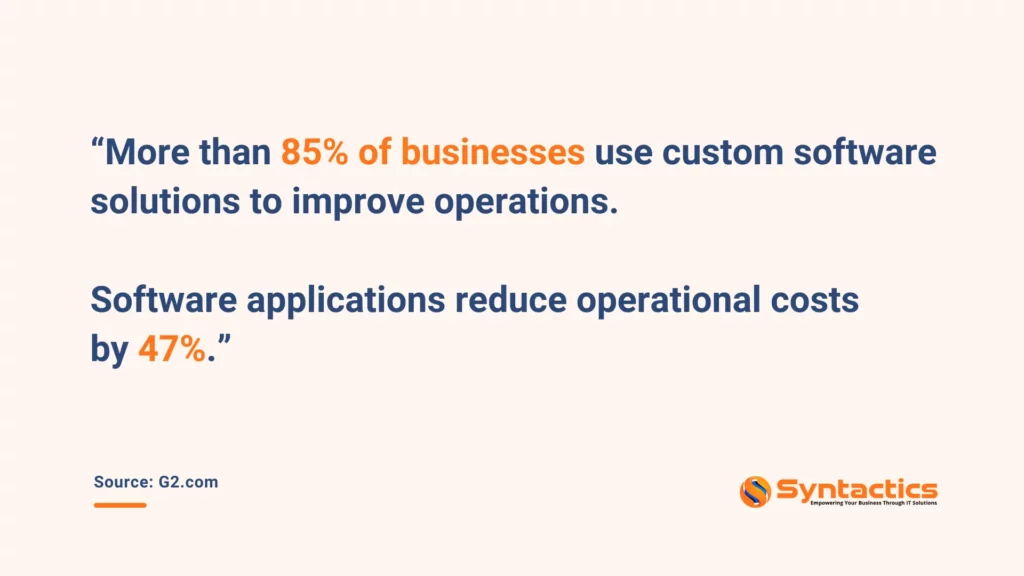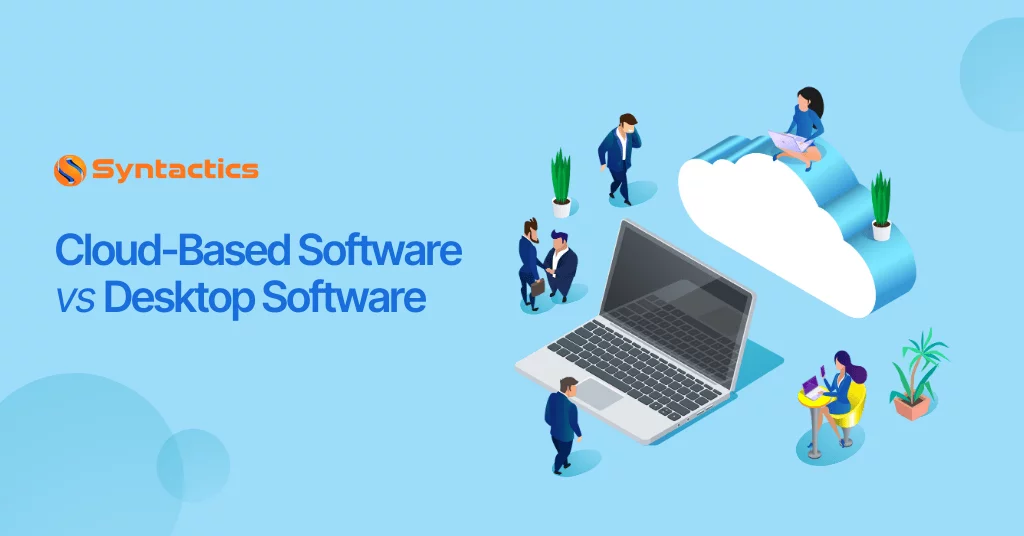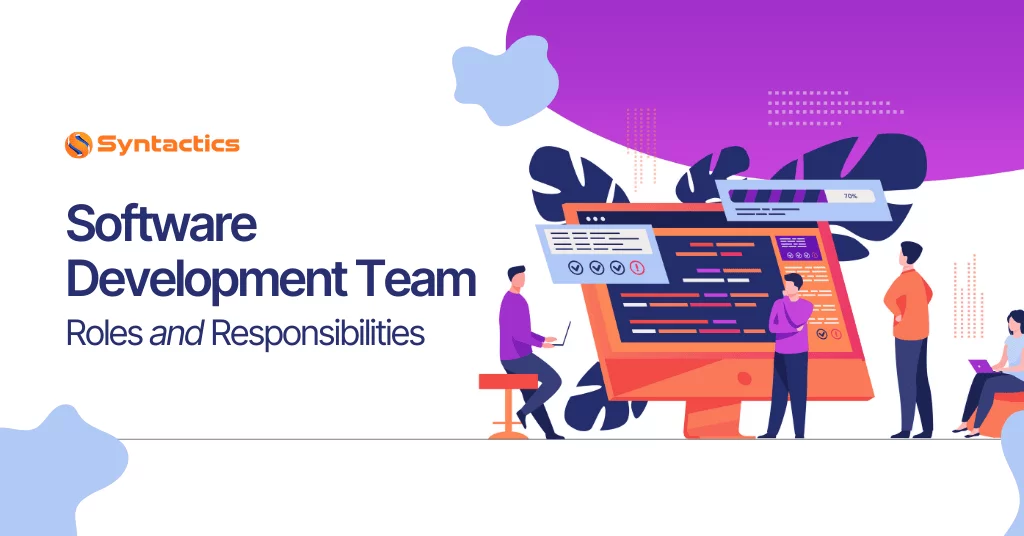
Choosing a Custom Software Development Company
Choosing the right custom software development company means finding a partner with an in-depth understanding of business requirements to craft tailored solutions. Through careful deliberation, organizations can select the ideal partner for software projects, whether it’s streamlining operations or enhancing customer journeys.

Source: G2.com.
What is Custom Software Development?
Custom software development involves designing, building, deploying, integrating, scaling, upgrading, and maintaining tailored software solutions to meet specific business needs.
Unlike packaged or Commercial Off-the-Shelf (COTS) software, which serves a broader audience, custom solutions are specifically built to align with a client’s exact requirements. This ensures a perfect fit while allowing for scalability as the business grows.
Custom software developers understand that each organization is unique, with distinct processes and needs. Developers design business applications and software that are tailor-fitted to an organization’s goals, processes, and needs, resulting in more flexibility in comparison to packaged or ready-to-use software.
Custom software products offer greater precision and scalability, streamlining routine processes to help businesses stay ahead.
Partnering with professional custom software development services can maximize business efficiency, improve profitability, and achieve higher Return on Investment (ROI).
Why Employ Custom Software?
Tailored Solutions
Off-the-shelf software programs perform general functionalities, but custom solutions align precisely to an organization‘s objectives and workflows without requiring adjustments or compromises.
Many organizations invest in a custom software development company to enhance customer experiences. Custom software’s tailored features and functionalities ensure user satisfaction by addressing specific needs.
For example, a custom-tailored Customer Relationship Management (CRM) system can improve engagement and communication through mobile accessibility, gamification, and other user-centric features.
Flexibility and Scalability
Modifying commercial off-the-shelf software is often challenging and time-consuming. In contrast, expert developers can adapt custom software to evolving needs.
Custom solutions also scale effortlessly, accommodating new users, features, or processes without the limitations of pre-built software.
Through custom development, experienced software developers ensure long-term adaptability by integrating the latest technologies and trends, keeping software relevant and competitive.
Enhanced Efficiency and Productivity
Custom software boosts operational efficiency and productivity by streamlining workflows and automating routine or repetitive tasks. By reducing reliance on manual processes, it minimizes errors, frees up resources, and saves time.
Additionally, custom software integrates seamlessly with existing tools and systems, improving workflow efficiency while minimizing disruptions.
Compatibility
A business application developer integrates custom software with the organization’s current systems so that staff are already familiar with the interface. This familiarity speeds up system adoption and reduces training time.
Unlike off-the-shelf software, which binds users to the vendor’s terms, custom solutions provide full control and ownership. Since the business owns the source code and intellectual property, they’re free to modify the software as needed.
Security
Anyone can buy commercial off-the-shelf software, making them more vulnerable to cyberattacks. Malicious actors can learn where and how to penetrate common weaknesses, increasing security risks.
According to Cybersecurity vulnerability (CVE) statistics and facts, 26,447 software vulnerabilities were detected in 2023, with more emerging daily. Fortunately, using custom software can minimize exposure by reducing common attack vectors.
Customized solutions comply with the industry’s security standards and include advanced security features tailored to specific business needs.
Long-Term Cost-Effectiveness
Businesses may spend more upfront on custom solutions than off-the-shelf or packaged software. However, tailored solutions don’t require constant modification to fit business needs.
Since the business retains ownership of the software, there’s no need to depend on third-party vendors or pay ongoing licensing fees.
Competitive Advantage
Custom solutions enhance operational efficiency and market differentiation. They align with business strategies, strengthening core competencies.
Many custom solutions can provide advanced analytics, which are vital for making quick, data-driven decisions. Additionally, they’re designed to improve customer satisfaction through faster response times or unique service offerings.
All these features highlight the importance of choosing a professional custom software developer who can deliver tailored solutions to drive a business forward.
How to Choose a Custom Software Development Company:
Define Needs and Goals
The first step is to identify the needs and goals, such as streamlining internal operations, enhancing customer experiences, or data management.
Learn about the differences between cloud-based and desktop software:
Next, outline the features, functionalities, and technology stack required to ensure alignment with potential development partners. Setting budgets, timelines, and long-term goals further streamlines the selection process.
Research Potential Companies
Market reputation is crucial when selecting custom development partners. Businesses can review a candidate company’s social media pages or dedicated websites to evaluate past performance.
It’s important to prioritize potential candidate companies with proven skills and experience in developing apps or software for desired industries or platforms.
Consider checking portfolios to evaluate past projects’ quality, creativity, and relevance.
Another way to evaluate potential candidates is to check reviews from past clients on platforms such as Clutch and GoodFirms to get an understanding of their reputation.
Collect Recommendations
One of the most effective ways to find a reliable development company is to ask for recommendations from within the same field or industry.
Seek honest feedback from those with firsthand experience working with development teams. This approach can speed up the process of finding the best custom software development firm.
Beyond direct referrals, businesses can find reviews and testimonials on Clutch or GoodFirms focusing on communication, reliability, and quality of work within client feedback.
Talk About Coding
After narrowing down the list of potential candidates, it’s necessary to talk with each one about their technical expertise and understand their approach to building the custom app.
Here are other considerations businesses can discuss with candidate companies:
- Guidelines such as “no buggy or resource-hungry codes,” “use more of slant coding,” or “create code that even ordinary humans can understand.“
- The company’s experience with the programming languages and tools needed for the software project.
- How the company handles software upgrades and growth.
- The company’s communication skills and what tools or platforms they use to provide updates. It’s also worth checking for potential language or cultural barriers that might impact collaboration.
- The development process, including the methodologies they use (e.g., Agile, Scrum, or Waterfall) to build the custom solution.
- Their development team structure (developers, designers, Quality Assurance specialists, and project managers).
- Their approach to data security and compliance with appropriate regulations.
- Post-development support, such as maintenance, updates, and support services.
Emphasize Delivery Time
Timely project delivery is a crucial factor when choosing a development company. Consider checking previous software projects to assess their track record in meeting deadlines.
When evaluating potential companies, it’s essential to learn about their average development timeframes, especially for similar projects, to gauge their efficiency.
Additionally, partner companies can provide project plans outlining milestones and deliverables to maintain alignment throughout the development process. Ensure that they account for the time needed for staff training and the time needed for debugging.
Conclusion
Technology drives organizational success by optimizing workflows and reducing costs. With a clear picture in mind of the ideal software, the search for a suitable development company becomes more straightforward.
Partnering with a custom software development company from the Philippines enhances efficiency and streamlines operations.
This blog was updated on February 4, 2025.
Frequently Asked Questions About Custom Software
What are some examples of custom software?
Custom software is any application or system that’s specifically designed to digitalize and streamline business processes and unique needs, resulting in improved efficiency.
Here are some common examples of custom software:
- CRM systems
- Enterprise Resource Planning (ERP) software
- Property management software
- eCommerce platforms
- Healthcare applications
- Mobile applications
- Business Process Automation (BPA) tools
How much does it cost to develop custom software?
The costs of custom software development can vary based on factors like project complexity and timeline. Reach out to us today to discuss your requirements, and we can provide an estimate.
How long does it take to depreciate custom software?
Custom software usually depreciates over three to five years but depends mainly on its expected useful life.




















SEO services in Thornton, CO
Thank you for providing such an informative and quality content. Good work keep it up